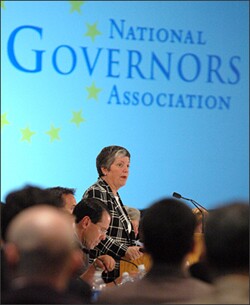Even though her stint as chair of the National Governors Association ended this week, Arizona Gov. Janet Napolitano is forging ahead with her national “Innovation America” initiative by forming a new foundation and convening a task force to recommend ways of reshaping public schools to help students better compete globally.

“This is my innovative way of keeping the agenda going,” Ms. Napolitano, a Democrat, said in an interview. “Now we’re looking at really tying innovation into the economic future of the states. The vast majority of governors are now engaged in this subject.” The subject of innovation is, indeed, a broad one. The initiative’s education and technology agenda focused on states’ building strong, competitive K-12 systems with a heavy emphasis on math and science. Ms. Napolitano worked on getting colleges and universities to better connect with their state and regional economies. And she tried to get business leaders involved in the conversation. Earlier this month, six states—Colorado, Hawaii, Minnesota, Ohio, Pennsylvania, and Virginia—won $500,000 each from the NGA to create science and technology education centers.
Ms. Napolitano explained Saturday that her initiative tries to answer this question: “How does the U.S. maintain and grow its place in the world as a place where new developments are conceived of and moved to market as quickly as possible?”
Foundation, Task Force Forming
The new Innovation America Foundation, which Gov. Napolitano announced Monday and is separate from the Washington-based NGA, is slated to start this fall with a public-outreach campaign that seeks to tout the work of American innovators and spur more innovation.
For more stories on this topic see Leadership and Management.
A Web site, www.youinnovate21.net, has been created and in October will showcase ithe work of high school students from around the country who will be asked to submit 30-second videos explaining what innovation means to them.
The companies and groups that have already pledged to participate in the foundation’s work, according to Ms. Napolitano’s office, include: the Advertising Council, Apple Inc., Microsoft Corp., eBay Inc., and the National Science Foundation. In the interview, Ms. Napolitano wouldn’t say how much start-up money she’s already secured for the foundation.
Ms. Napolitano’s one-year term as the chair of the NGA ended during the group’s July 20-23 meeting here in Michigan, which drew about 30 governors—though some superstars were absent. No-shows included Republican Gov. Arnold Schwarzenegger of California, Democratic Gov. Eliot Spitzer of New York, and Democratic Gov. Bill Richardson of New Mexico, who is running for president.
The new NGA chair, Minnesota Gov. Tim Pawlenty, a Republican who has made high school improvement a priority in his state, has chosen energy as his platform issue for the coming year.
But Gov. Napolitano said she wants to continue the work she started last summer. In addition to the new foundation, she’s working with the NGA as well as the Council of Chief State School Officers and Achieve Inc.—both based in Washington—to convene a task force of corporate executives, state education chiefs, governors’ staff members, university officials, and education think tank leaders.
The task force is to be charged with helping states benchmark their education systems against international best practices, not just against U.S. standards. Two state schools chiefs, Ohio’s Susan T. Zelman and Wisconsin’s Elizabeth Burmaster, have agreed to serve on the advisory group, according to Ms. Napolitano’s office.
Business Leaders Heard
This fall, states will be invited to take part in a learning lab that will showcase Alabama’s efforts to improve its K-12 standards and offerings in science, technology, engineering, and math, called the STEM subjects.
Gov. Napolitano is pushing states—and is working in her home state of Arizona—to ratify compacts with their postsecondary institutions to encourage them to be more innovative and more closely align their programs with regional economic needs.
From the business community, governors heard that those kinds of changes in education are sorely needed.
“Our education system has fallen flat,” said Randall L. Stephenson, the chairman and chief executive officer of AT&T Inc., during Saturday’s opening session. “We’ve gotten fat and lazy.”
And with so many children learning and communicating in ways different from those of older generations, Google Inc. Chairman and CEO Eric E. Schmidt told the governors that classrooms need to be transformed to harness the power of the Internet, with less reliance on teachers’ standing before students and lecturing.
Mr. Schmidt said: “We are very much at the beginning of a real revolution in education.”




